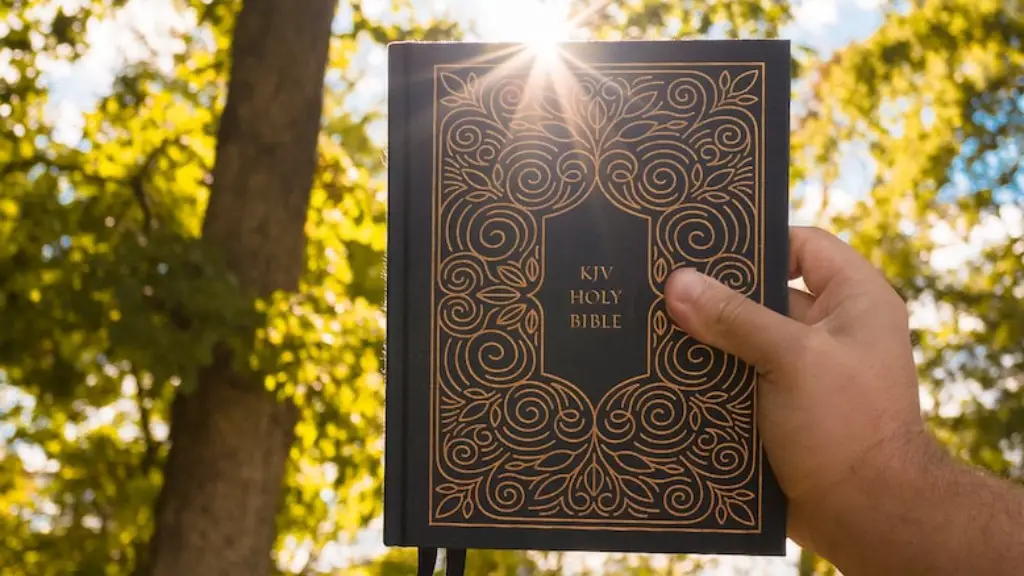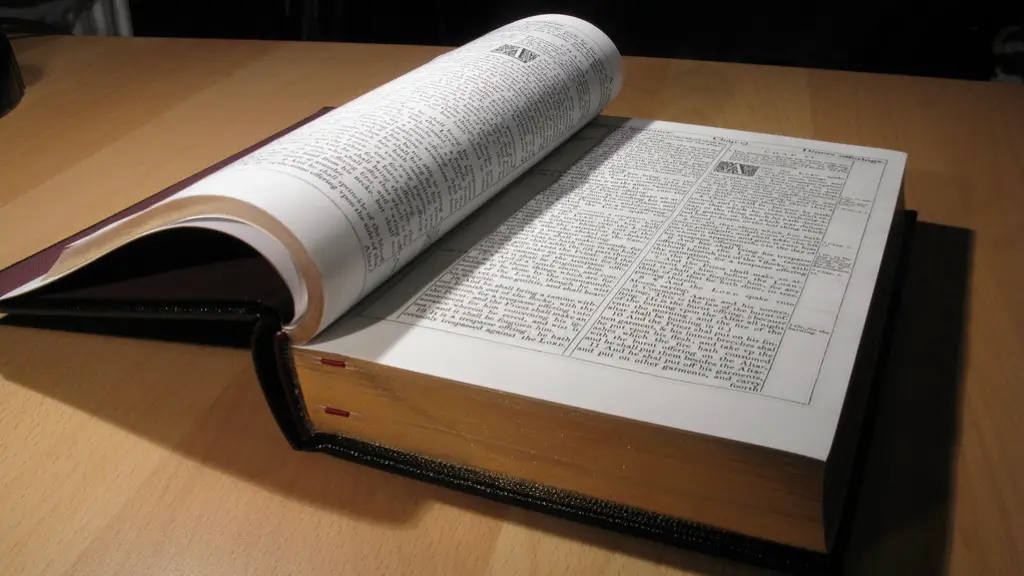What has changed over the centuries – were the ancient gods really as portrayed in the Bible? Is the Bible accurate? Has it been altered? These are some interesting questions to consider when looking critically at religious texts. The history of the Bible is long and complex, and the answer to these questions is far from simple.
From the earliest days, the texts called the Bible were used as a source of religious teachings which were passed on orally. It wasn’t until the printing press was invented in the fifteenth century that the texts were written down and preserved as books. Over time, multiple copies of the texts of the Bible were made and circulated, and some of these copies had parts removed, added or rewritten.
This has caused some scholars to wonder if the original text has been altered over the centuries. Although there is evidence that parts of the Bible have been altered, there is no definitive way to prove this. Scholars agree that some alterations were unintentional, possibly due to human error or copying mistakes. Other alterations could have been intentional, however, as there have been attempts to distort the original meaning of the Bible. In some cases, entire sections of the Bible were removed and replaced with ones that had a more modern or desirable message.
The ways in which the text of the Bible has been altered over the centuries is an ongoing debate. There are those who believe that all changes were unintentional, with some arguing that the true message of the Bible will never be lost despite any alterations. Others are concerned with the amount of alterations and the fact that they were not made in an open, transparent way. In any case, it is important to recognize that alterations have been made and that the original meaning of the Bible has changed over time.
There have been many attempts to reconstruct the original texts of the Bible. Scholars have been able to cross-reference ancient manuscript copies of the Bible to create a more accurate picture of what the original texts contained. This research has enabled some to argue that certain passages were removed or rewritten intentionally to support a biased interpretation of the Bible.
In addition to the debate about the authenticity of the Bible, there are questions about the accuracy of translations from ancient languages to more modern ones. Although modern translations are often considered to be more faithful to the original texts, it is important to note that there is no way to verify how close a translation is to the original. This means that there is still a risk that a translation could be influenced by the translator’s own interpretation of the Bible.
Overall, it is important to remember that the Bible is an ancient text and that it has evolved over time. While some of the changes may have been unintentional, there is evidence that parts have been changed intentionally. It is also important to recognize that translations from ancient languages are not infallible and that the interpretation of the Bible is always subjective. The history and evolution of the Bible is complex and fascinating, and it is always worth exploring the various perspectives and arguments.
Motivations
When considering the alteration of the Bible, it is important to consider the reasons behind it. This includes the motivations of those involved, as well as the political and social context of the time. In some cases, alterations were made out of a desire to support a particular belief or political agenda. For instance, some early translations of the Bible were heavily influenced by the religious and political views of the translator. In other cases, alterations may have been made to combat heresies or to make the text easier to understand for new generations.
It can also be argued that certain alterations were made out of a desire to suppress certain aspects of the original message. For example, some passages may have been removed or rewritten to downplay the importance of certain figures, or to portray certain actions in a more positive light. In any case, it is important to understand that many of the changes made to the Bible were not made in a vacuum, and that there were often hidden motives behind them.
Historical Documentation
The history of the Bible is extensive and includes the work of numerous authors and translators. Therefore, it is important to be aware of the historical documents which give us insight into the history of the Bible and how it has evolved over time. This includes ancient manuscripts, commentaries, council records and other documents which give us an insight into the history of the Bible.
This information can help us to gain a better understanding of the differences between the original texts and translations, as well as the motives behind any alterations. It also provides us with a more rounded view of the Bible, allowing us to compare the changes made over the years and to gain a more accurate perspective on the messages contained within.
Interpretations
When considering the issue of alteration to the Bible, it is essential to consider different interpretations of the original texts. This includes looking at how different cultures, religions and political ideologies have understood the same passages. It can be argued that some interpretations have been more accurate than others, but it is important to recognize that there is no single ‘correct’ interpretation of the Bible.
For instance, some scholars argue that the original intended meaning of the Bible has been buried underneath centuries of highly subjective interpretations. While others believe that the original texts are still intact, and that any changes made over the years have been minor and insignificant. Ultimately, it is important to remember that each interpretation of the Bible is informed by a particular cultural, religious and political context, and that all interpretations must be viewed critically and with an open mind.
Impact
It is also important to consider how the changes to the Bible have impacted religion and society. In some cases, new interpretations of the Bible have led to changes in religious doctrine and practices. In other cases, alterations have been used to support particular political or ideological agendas. In any case, it is important to understand that these changes can have far-reaching impacts on religious observance and belief.
The questions surrounding the alteration of the Bible have been debated for centuries. While there is still no definitive answer as to whether or not the Bible has been altered, it is important to consider the implications of any changes that have been made. We must also remember that all interpretations of the Bible are subjective and influenced by the cultural, religious and political contexts of the time. Ultimately, this is an ongoing debate which has far-reaching implications for how we understand and interpret the Bible.
Preservation
The methods used to preserve the Bible over the years has also had an impact on how the text has been altered. For instance, the earliest copies of the Bible were written on parchment scrolls which were not very durable and could be easily damaged. Later copies were made with vellum, a more durable material which was more resistant to damage. These changes allowed for the Bible to be preserved for longer and made it less likely for parts to be unintentionally changed.
In addition, the invention of the printing press in the fifteenth century allowed for multiple copies of the Bible to be made quickly and easily. This allowed for the texts to be disseminated more widely, which in turn made it more likely that the text of the Bible was altered in some way. The production of printed copies of the Bible also allowed for translations to be made into different languages, which further increased the risk of unintentional changes.
It is also important to remember that, in some cases, alterations have been made for reasons of censorship or control. In certain instances, parts of the Bible have been removed to prevent certain messages from being spread or to control the spread of unpopular beliefs. Thus, it is important to consider the ways in which the preservation of the Bible has been used to alter the meaning of the text.
Conclusion
Overall, the issue of alteration to the Bible is a complex and ongoing debate. While some argue that the original texts are still intact, there is evidence that parts of the Bible have been altered over the years. It is important to consider the motivations behind any changes, as well as the ways in which the preservation of the Bible has influenced the changes made over time. We must also recognize that all interpretations of the Bible are subjective and that change is an integral part of the history of the Bible.




